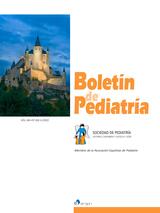Diagnóstico de SARS-CoV-2 mediante test de antígeno en un Servicio de Urgencias Pediátricas
P. Andrés Porras
Bol. Pediatr. 2022; 62 (260): 127 - 133
Introducción. Encontrar un método diagnóstico para la enfermedad por SARS-CoV-2, eficiente y accesible ha sido uno de los grandes problemas a lo largo de la epidemia por COVID 19. Pacientes y métodos. Estudio descriptivo retrospectivo de los datos clínicos de los pacientes sometidos a test de antígenos para SARS-CoV-2 realizados en el Servicio de Urgencias Pediátricas de un hospital terciario, entre el 22/12/2021 y el 10/02/2022, y su concordancia con el resultado de la RT-PCR de SARS-CoV-2 en caso de disponer de ésta. Resultados. Se realizaron 653 test de antígenos (53,9% varones), siendo positivos el 26,6%. La edad media fue estadísticamente mayor en aquellos con resultado positivo (67,3±51 meses, frente a a 51,95±51,3 meses). El síntoma más frecuente entre los pacientes positivos fue la fiebre en el 79%. Entre los 387 pacientes con test negativo, se realizaron 92 RT-PCR, resultando positivas 11 de ellas (12%) 9 de los 11 pacientes con RT-PCR positivo tenían un contacto familiar estrecho y, de estas, 7 presentaban fiebre. Resulto significativa la relación entre tener un contacto familiar y un test de antígeno positivo (p<0,01), pero no con otro tipo de contacto. Discusión. Los pacientes que presentaron RT-PCR para SARS-CoV-2 positiva, con test de antígeno negativo presentaban en su mayoría contacto familiar y fiebre. El contacto no familiar no tenía mayor porcentaje de falsos negativos que aquellos sin contacto conocido. La variación de positividad puede deberse a las diferencias en la valoración de caso sospechoso y a la técnica de obtención de muestra.
Diagnosis of SARS-CoV-2 by antigen test in a Pediatric Emergency Department
Introduction. Finding an efficient and accessible diagnostic method for SARS-CoV-2 disease has been one of the big problems throughout the COVID 19 epidemic. Patients and methods. Retrospective descriptive study of the clinical data of patients undergoing antigen tests for SARS-CoV-2 carried out in the Pediatric Emergency Department of a tertiary hospital, between 22/12/2021 and 10/02/2022, and its concordance with the result of the RT-PCR of SARS-CoV-2 if available. Result. 653 antigen tests were performed (53.9% male), 26.6% were positive. The mean age was statistically higher in those with a positive result (67.3±51 months, compared to 51.95±51.3 months). The most frequent symptom among positive patients was fever in 79%. Among the 387 patients with a negative test, 92 RT-PCR were performed, resulting in positive 11 of them (12%) 9 of the 11 patients with positive RT-PCR had a close family contact and, of these, 7 had fever. The relationship between having a family contact and a positive antigen test (p<0.01) was significant, but not with another type of contact. Discussion. Patients who presented RT-PCR for SARSCoV-2 positive, with negative antigen test had mostly family contact and fever. Non-family contact had no higher percentage of false negatives than those with no known contact. The variation in positivity may be due to differences in the assessment of suspected case and sample collection technique.
Artículo completo (PDF) (98 kb.)
- Otros
Buscar en el boletín
Año 2022, Volumen 62, Número 260

Boletín completo en PDF (8748 kb.)